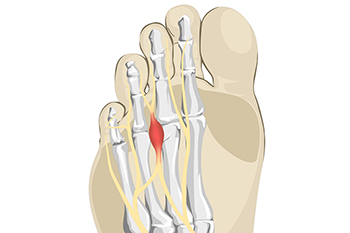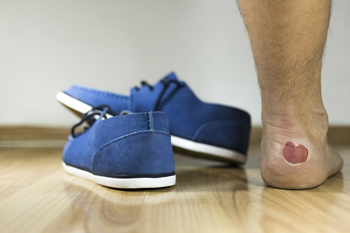Items filtered by date: December 2022
High Heels and Morton’s Neuroma

The pain that is felt from the foot condition that is known as Morton’s neuroma cannot be ignored. It is an ailment that affects the nerve that is found between the third and fourth toes, and can happen from frequently wearing high heels. These types of shoes often lack adequate room in the toe area, limiting the room for them to move freely in. This may ultimately lead to irritation and inflammation of the nerves, often causing pain and discomfort. The tissue surrounding the nerve can become thick, and patients may feel a sharp or burning pain. Additionally, people who have this type of pain may liken the sensation to walking on a marble, and often look for relief. This can be found when appropriate shoes are worn, and it is beneficial to frequently rest the affected foot. Maintaining a healthy weight may help to take the stress off of the overall foot. If you believe that you may have this condition, it is strongly suggested that you consult with a podiatrist who can effectively diagnose and treat Morton’s neuroma.
Morton’s neuroma is a very uncomfortable condition to live with. If you think you have Morton’s neuroma, contact one of our podiatrists of Nashville Family Foot Care. Our practitioners will attend to all of your foot care needs and answer any of your related questions.
Morton’s Neuroma
Morton's neuroma is a painful foot condition that commonly affects the areas between the second and third or third and fourth toe, although other areas of the foot are also susceptible. Morton’s neuroma is caused by an inflamed nerve in the foot that is being squeezed and aggravated by surrounding bones.
What Increases the Chances of Having Morton’s Neuroma?
- Ill-fitting high heels or shoes that add pressure to the toe or foot
- Jogging, running or any sport that involves constant impact to the foot
- Flat feet, bunions, and any other foot deformities
Morton’s neuroma is a very treatable condition. Orthotics and shoe inserts can often be used to alleviate the pain on the forefront of the feet. In more severe cases, corticosteroids can also be prescribed. In order to figure out the best treatment for your neuroma, it’s recommended to seek the care of a podiatrist who can diagnose your condition and provide different treatment options.
If you have any questions, please feel free to contact our office located in Nashville, TN . We offer the newest diagnostic and treatment technologies for all your foot care needs.
Get Proper Treatment for Ankle Injuries
Various Reasons for Blisters to Develop on the Feet

When a blister develops on the feet, it is the body’s natural defense for protecting damaged skin. This can happen as a result of wearing shoes and socks that do not fit correctly, which may cause pressure on different areas of the foot. A blister is a small bubble that is filled with protective fluid. It is important that it is not prematurely popped, and it will gradually drain when the new skin forms and is no longer needed. There are other reasons a blister may form, including having an allergic reaction to an insect bite or chemical substance. Additionally, medical conditions such as eczema, psoriasis, heart conditions, or immune disorders may lead to blisters forming. If you have recurring blisters on the feet, please consult with a podiatrist who can determine the reason why, and offer you methods which may help to prevent blisters in the future.
Blisters are prone to making everyday activities extremely uncomfortable. If your feet are hurting, contact one of our podiatrists of Nashville Family Foot Care. Our practitioners can provide the care you need to keep you pain-free and on your feet.
Foot Blisters
Foot blisters develop as a result of constantly wearing tight or ill-fitting footwear. This happens due to the constant rubbing from the shoe, which can often lead to pain.
What Are Foot Blisters?
A foot blister is a small fluid-filled pocket that forms on the upper-most layer of the skin. Blisters are filled with clear fluid and can lead to blood drainage or pus if the area becomes infected.
How Do Blisters Form?
Blisters on the feet are often the result of constant friction of skin and material, usually by shoe rubbing. Walking in sandals, boots, or shoes that don’t fit properly for long periods of time can result in a blister. Having consistent foot moisture and humidity can easily lead to blister formation.
Prevention & Treatment
It is important to properly care for the affected area in order to prevent infection and ease the pain. Do not lance the blister and use a Band-Aid to provide pain relief. Also, be sure to keep your feet dry and wear proper fitting shoes. If you see blood or pus in a blister, seek assistance from a podiatrist.
If you have any questions, please feel free to contact our office located in Nashville, TN . We offer the newest diagnostic and treatment technologies for all your foot care needs.

